Ever felt that annoying itch on your scalp or seen white flakes on your dark shirt? You’re not alone. Dandruff affects nearly 50% of adults worldwide, causing embarrassment and discomfort for millions. The good news is that the right dandruff treatment can improve your scalp health and boost your confidence.
Understanding dandruff is key to managing it. Whether you’re looking for the best dandruff shampoo or natural remedies, this guide has you covered. An anti-dandruff shampoo is a great first step against this common scalp issue.
Many things can cause dandruff, like oily skin, fungal growth, and environmental factors. Males are more likely to get it, especially in colder months when dry air affects scalp health. Your fight against dandruff is unique, but there are proven ways to get relief.
Today, there are many dandruff treatments available. From over-the-counter options to specialized shampoos with zinc pyrithione and ketoconazole, there’s something for everyone. By knowing your scalp’s needs, you can find the best way to manage and get rid of dandruff.
Table of Contents
Understanding Dandruff: What It Is
Dandruff is a common scalp condition that affects millions of people worldwide. It happens when your scalp sheds skin cells too fast. Knowing about it can help you take better care of your scalp.
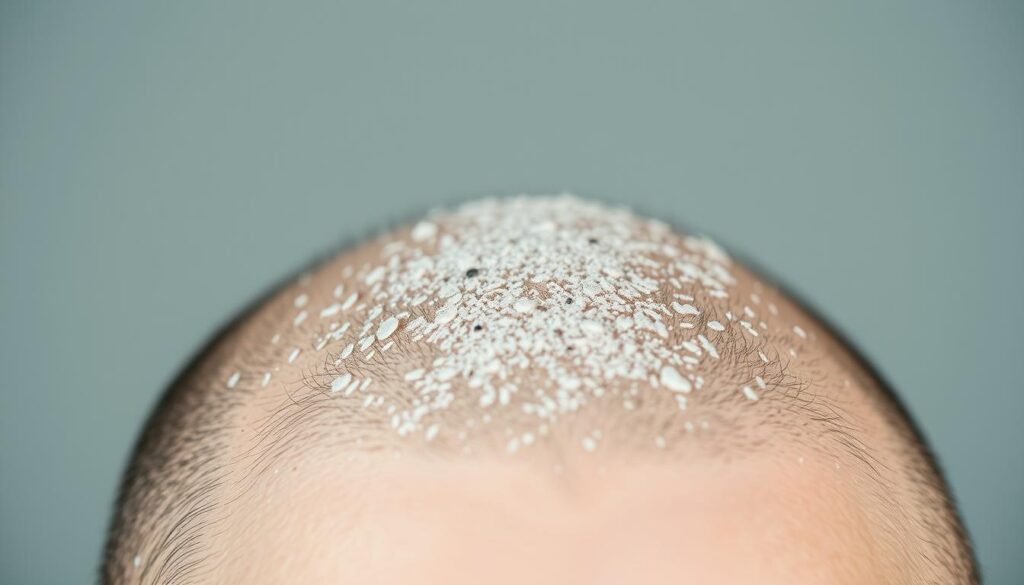
Dandruff is more than just annoying white flakes. It’s a mix of your skin, oil, and tiny organisms on your scalp. Things like diet and stress can make it worse. So, taking care of your scalp is key to your hygiene.
Definition of Dandruff
Dandruff is when dead skin cells fall off your scalp, showing up as white or yellowish flakes. It’s different from a dry scalp because it’s oily. Many things can cause or make it worse, like too much oil, yeast, and how fast your skin regenerates.
- Excess oil production
- Yeast overgrowth (Malassezia)
- Skin cell turnover rate
- Individual skin sensitivity
Common Symptoms and Signs
Knowing the signs of dandruff helps you pick the right shampoo and treatment. Look for these signs:
| Symptom | Description |
|---|---|
| Flaking | White or yellowish skin flakes on scalp and shoulders |
| Itching | Persistent scalp irritation and discomfort |
| Scalp Redness | Inflammation or slight irritation of the scalp skin |
Interesting fact: About 42% of infants get seborrheic dermatitis, showing how common scalp issues are at any age.
“Understanding your scalp is the first step to effective dandruff management.”
Don’t let dandruff take over your life. With the right scalp care and treatment, you can manage it well. This way, it won’t disrupt your daily life.
Main Causes of Dandruff
Knowing what causes dandruff is key to good hair and scalp care. Dandruff affects about 50% of adults at some point. Many factors can lead to it.
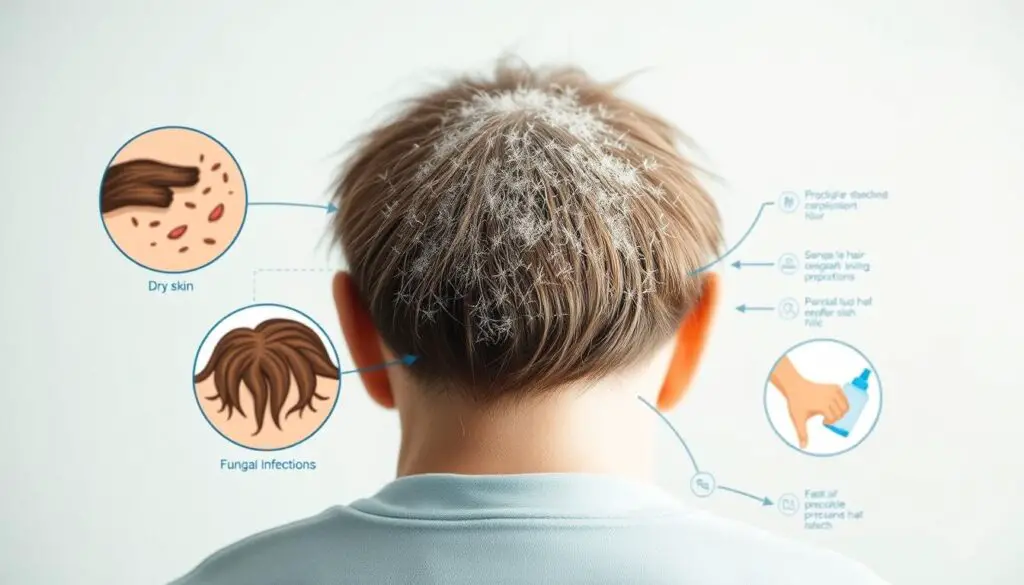
The main causes of dandruff are more complex than you might think. Let’s look at the main factors that can cause this scalp problem:
Dry Skin and Scalp Conditions
Dry skin is a big reason for dandruff. When it’s colder and drier, your scalp flakes more. This is tough for people with dry skin or those in cool, dry places.
- Low humidity makes skin dry
- Cool weather makes scalp irritation worse
- Seasonal changes affect scalp health
Oily Skin and Seborrheic Dermatitis
Interestingly, oily skin can also cause dandruff. Seborrheic dermatitis makes skin flaky because of too much oil. Men are more likely to get it, with 60-70% of cases in men due to hormones.
“The balance of your scalp’s natural oils plays a crucial role in preventing dandruff.” – Dermatology Research Institute
Fungal Infections
The Malassezia fungus is a big part of dandruff. It eats scalp oils and grows fast, causing irritation and flaking. A 2018 survey found 18% of people had dandruff symptoms in the past year.
| Fungal Impact | Percentage |
|---|---|
| Malassezia Density | Directly linked to dandruff severity |
| Fungus Occurrence | Present in most adults |
Good scalp care means knowing these causes and picking the right treatments for your dandruff.
Other Contributing Factors
Dandruff isn’t just about scalp health. Many lifestyle factors can affect your hair care and cause white flakes. Knowing these factors helps you manage scalp care better.
Stress and Mental Health Impact
Your mental state is key to scalp health. Chronic stress can upset your body’s balance, making dandruff worse. High stress raises cortisol, leading to:
- More oil on the scalp
- Weaker immune system
- Hormonal issues affecting skin
Diet and Nutrition Connections
What you eat affects your scalp. Lack of nutrients can cause dandruff. Important foods include:
- Zinc and B-vitamins
- Omega-3 fatty acids
- Probiotics for gut and skin
Hair Care Product Influences
Not all hair products are good for your scalp. Some can make dandruff worse by:
- Building up on your scalp
- Blocking hair follicles
- Causing scalp irritation
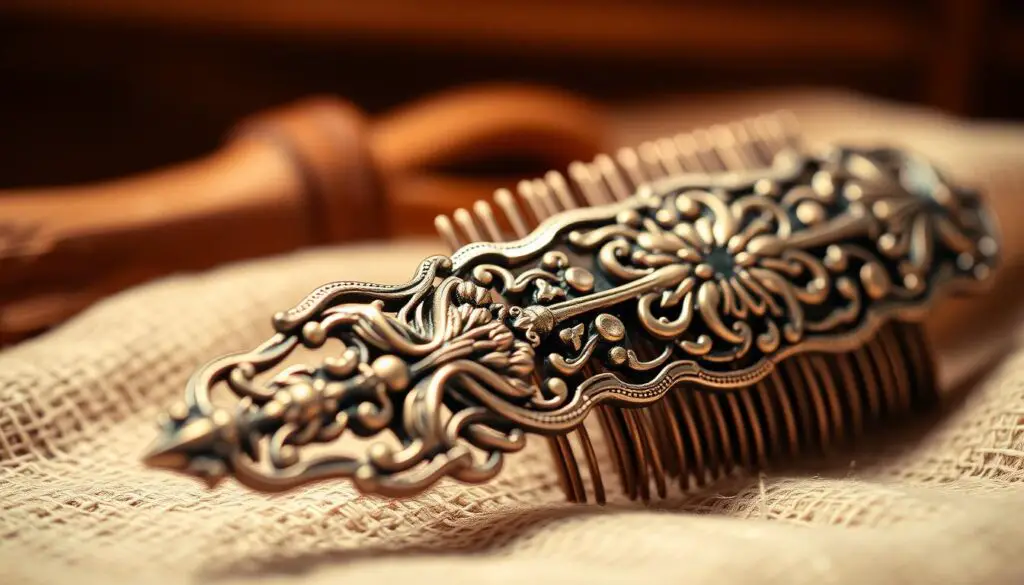
“Your scalp health is a reflection of your overall wellness and lifestyle choices.” – Dermatology Insights
| Factor | Potential Impact on Dandruff |
|---|---|
| Stress Levels | High stress can increase scalp oil production |
| Nutritional Intake | Deficiencies may worsen scalp conditions |
| Hair Product Quality | Inappropriate products can trigger inflammation |
Understanding these factors helps you manage your scalp care better. This can reduce dandruff.
How to Diagnose Dandruff
To figure out if you have dandruff, watch your scalp and hair closely. Spotting the signs early helps you pick the best treatment and care.
Self-Assessment Techniques
Checking for dandruff at home is simple. Look for these signs:
- White or yellowish flakes on your shoulders or clothes
- Itchy scalp
- Oily or dry patches on your scalp
- More skin cells shedding
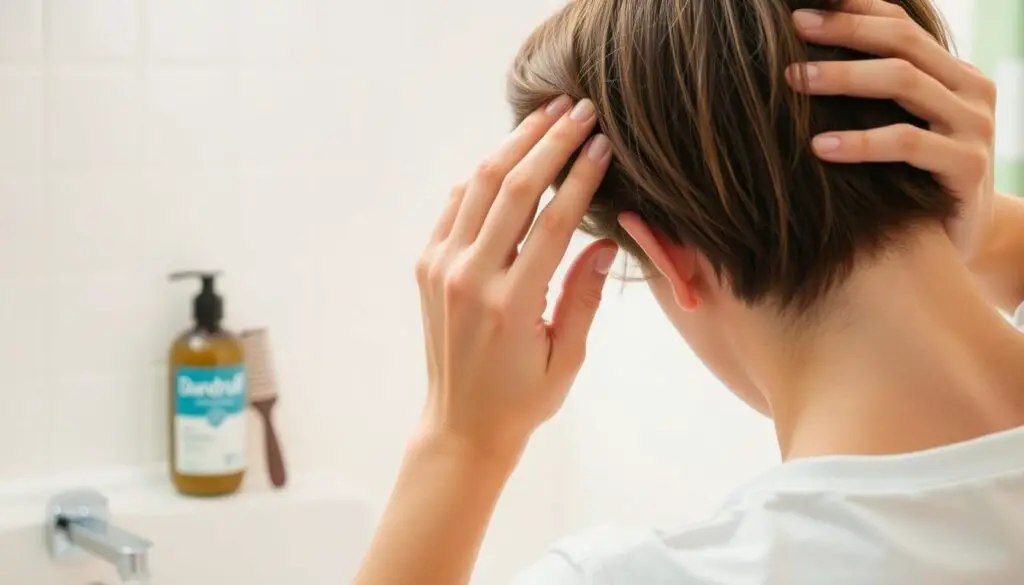
When to See a Professional
Some dandruff cases need a doctor’s help, even with over-the-counter treatments.
| Symptoms | Recommended Action |
|---|---|
| Severe scalp inflammation | See a dermatologist right away |
| No improvement after 2-3 weeks of treatment | Get a professional check-up |
| Excessive scalp redness or irritation | Get medical advice |
Dermatologists offer advanced scalp care and can find hidden causes of dandruff. Remember, persistent symptoms could indicate a more serious scalp health issue.
“Early detection and proper treatment are key to managing dandruff effectively.” – Scalp Health Experts
Keep track of your symptoms and take care of your scalp. If home treatments don’t work, get professional help.
Quick Home Remedies
Dealing with dandruff can be frustrating. But, there are many effective home remedies to help. These natural solutions gently control scalp flaking and irritation.

Looking into natural dandruff treatments can offer relief. You don’t need harsh chemicals. Here are some powerful home remedies to improve your scalp health.
Apple Cider Vinegar Remedy
Apple cider vinegar is a strong dandruff treatment. It balances your scalp’s pH levels. The acidic properties fight fungal growth and reduce flaking.
- Mix 1/4 cup apple cider vinegar with 1/4 cup water
- Apply to scalp after shampooing
- Leave for 15 minutes before rinsing
- Use up to twice a week
Coconut Oil Treatment
Coconut oil is a great natural remedy for hair care. It soothes and moisturizes your scalp. Its antifungal properties make it a top choice for dandruff treatment.
- Use 3-5 teaspoons of coconut oil
- Massage thoroughly into scalp
- Leave for one hour before washing
- Apply once a week
Tea Tree Oil Solution
Tea tree oil is famous for its antifungal and antimicrobial properties. It’s a natural way to manage dandruff symptoms.
| Dilution Ratio | Application Method | Frequency |
|---|---|---|
| 5-10 drops per ounce of carrier oil | Massage into scalp | 1-2 times weekly |
“Natural remedies can be powerful allies in your fight against dandruff.” – Dermatology Scalp Care Expert
Remember, consistency is key when using these home remedies. Watch how your scalp responds. Adjust your hair care routine as needed.
Over-the-Counter Treatments
Managing dandruff starts with the right anti-dandruff shampoo. Experts tested over 60 products. They found several effective solutions to fight scalp irritation and flaking.
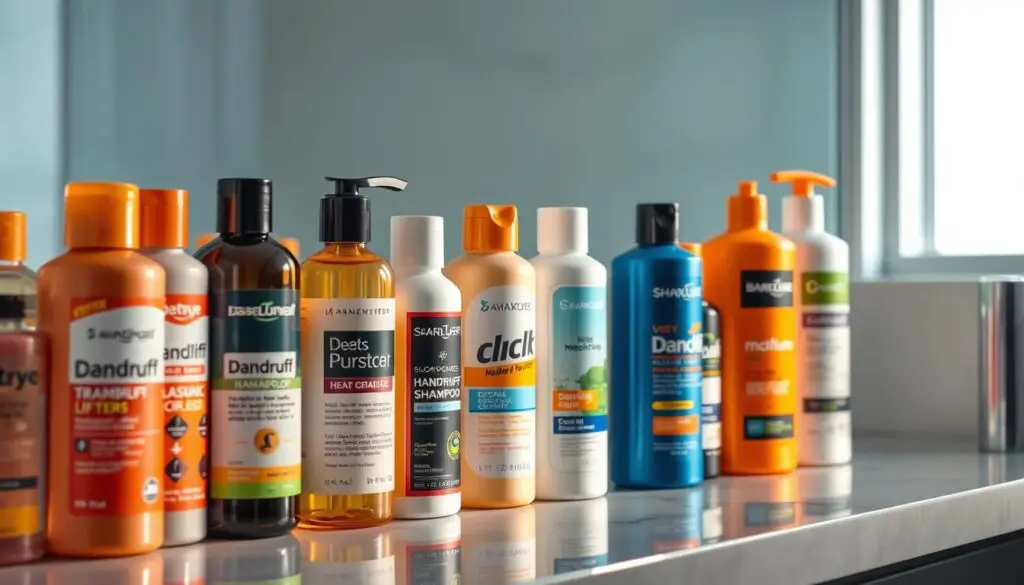
Top Anti-Dandruff Shampoos to Consider
Looking for the best dandruff shampoo? Here are some top choices:
- Head & Shoulders Clinical Strength ($19)
- Neutrogena T/Sal Therapeutic Shampoo ($11)
- Dove DermaCare Scalp Anti-Dandruff Shampoo ($5)
Key Ingredients to Look For
Ingredients target different dandruff issues. Here’s what works:
| Ingredient | Benefit | Example Product |
|---|---|---|
| Pyrithione Zinc Shampoo | Reduces fungal growth | Head & Shoulders |
| Ketoconazole Shampoo | Antifungal treatment | Nizoral |
| Salicylic Acid Shampoo | Exfoliates scalp | Ouai Anti-Dandruff |
| Selenium Sulfide Shampoo | Controls excessive skin cell production | Selsun Blue |
Application Tips for Maximum Effectiveness
To maximize your shampoo’s benefits, follow these tips:
- Use 2-3 times per week for consistent results
- Leave the shampoo on for 3-5 minutes before rinsing
- Massage thoroughly into the scalp
- Be patient – noticeable improvements typically take 2-3 weeks
“Consistency is key when treating dandruff. Your scalp health depends on regular, targeted care.” – Dermatology Experts
Remember, everyone’s scalp is different. You might need to try different shampoos to find the right one for your dandruff.
Prescription Treatments
If over-the-counter treatments don’t work, your dermatologist might suggest stronger options. Severe dandruff and seborrheic dermatitis need special medical help. This is to manage symptoms and improve scalp health.
Corticosteroid Treatments
Corticosteroid medications can lessen inflammation and soothe scalp irritation from dandruff. These treatments come in different forms:
- Topical steroid creams
- Medicated scalp solutions
- Prescription-strength shampoos
Antifungal Medications
Antifungal meds are key in treating dandruff since fungus can cause it. Dermatologists might prescribe:
- Ketoconazole cream
- Oral antifungal medications
- Prescription-strength topical treatments
“Persistent dandruff requires professional medical assessment to determine the most effective treatment strategy.”
It’s important for patients to work with their healthcare providers. Together, they can create a treatment plan that fits the patient’s specific needs.
| Medication Type | Primary Function | Typical Usage |
|---|---|---|
| Topical Corticosteroids | Reduce Inflammation | 2-4 weeks |
| Antifungal Creams | Combat Fungal Growth | 4-6 weeks |
| Prescription Shampoos | Comprehensive Scalp Care | Ongoing management |
Note: Always consult a dermatologist to determine the most appropriate prescription treatment for your specific dandruff condition.
Lifestyle Changes to Control Dandruff
Managing dandruff is more than just using special shampoos. Your daily habits and lifestyle choices are key to scalp and hair health.
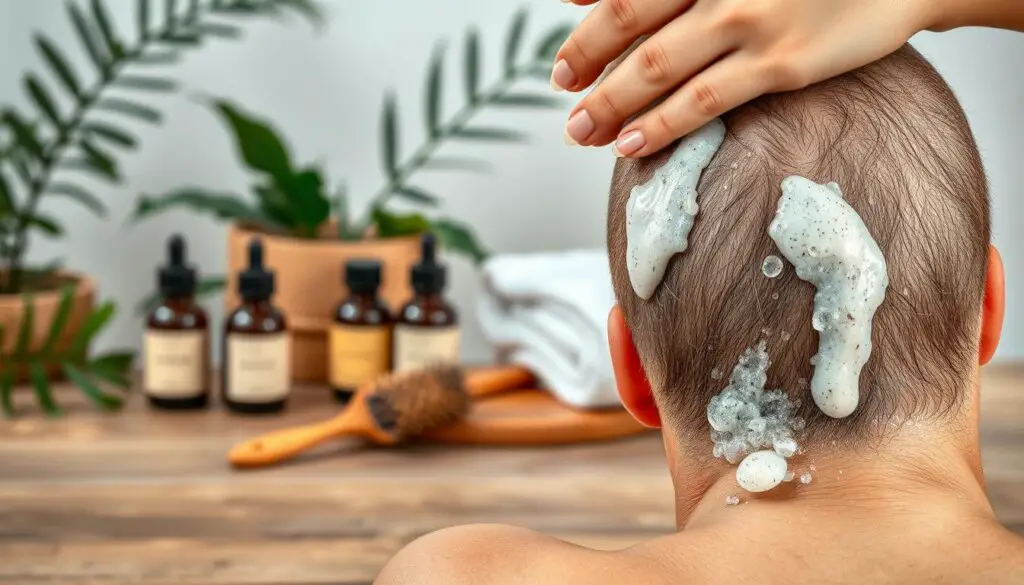
Effective dandruff management involves three key lifestyle modifications:
Stress Management Techniques
Stress can make dandruff worse. Here are some ways to reduce stress:
- Practice daily meditation for 10-15 minutes
- Engage in regular physical exercise
- Maintain consistent sleep schedules
- Try deep breathing exercises
Dietary Adjustments
Your diet affects your scalp health. Eat foods that are good for your skin and hair:
| Nutrient | Benefits for Scalp | Food Sources |
|---|---|---|
| Omega-3 Fatty Acids | Reduces inflammation | Salmon, chia seeds, walnuts |
| Zinc | Supports skin healing | Oysters, pumpkin seeds |
| Vitamin B | Promotes healthy skin cell production | Eggs, whole grains |
Regular Scalp Care
Make a regular scalp care routine that includes:
- Gentle scalp massages to improve circulation
- Using pH-balanced hair care products
- Avoiding excessive heat styling
- Keeping hair and scalp clean
“Your scalp is the foundation of healthy hair. Treat it with care and attention.” – Dermatology Expert
By making these lifestyle changes, you can manage dandruff and keep your scalp and hair healthy.
Benefits of Professional Treatments
When home remedies and over-the-counter treatments don’t work, it’s time to see a dermatologist. Dermatologists are experts in treating tough dandruff cases that don’t get better with regular treatments.

Professional dandruff treatment offers detailed solutions for those with ongoing scalp problems. About 50% of people worldwide deal with dandruff at some point. So, getting expert advice is key.
When to Consult a Dermatologist
It’s time to see a dermatologist if you have:
- Severe scalp itching that disrupts your daily life
- Dandruff that lasts more than 2-3 months
- Signs of a scalp infection
- Excessive hair loss along with dandruff
Treatment Options from Professionals
Dermatologists offer various treatments for dandruff:
| Treatment Type | Effectiveness | Duration |
|---|---|---|
| Prescription Antifungal Medications | Up to 80% reduction in symptoms | 4-6 weeks |
| Specialized Scalp Treatments | 50% improvement in scalp health | Ongoing management |
| Advanced Diagnostic Testing | Precise identification of root causes | Initial consultation |
“Professional treatment can transform your scalp care journey, providing personalized solutions beyond generic approaches.” – Dermatology Experts
Experts can also create a scalp care plan just for you. Since men have a 70% chance of getting dandruff, targeted treatments are very helpful.
Long-Term Benefits
Professional dandruff treatment brings lasting benefits, including:
- Comprehensive diagnostic approach
- Personalized treatment plans
- Prevention of potential hair loss
- Advanced medical-grade solutions
Investing in professional care can significantly improve your scalp health and overall confidence.
Myths and Misconceptions About Dandruff
Dandruff is a common scalp condition filled with misunderstandings. Knowing the truth can help you find better ways to treat it. It also improves your scalp care.
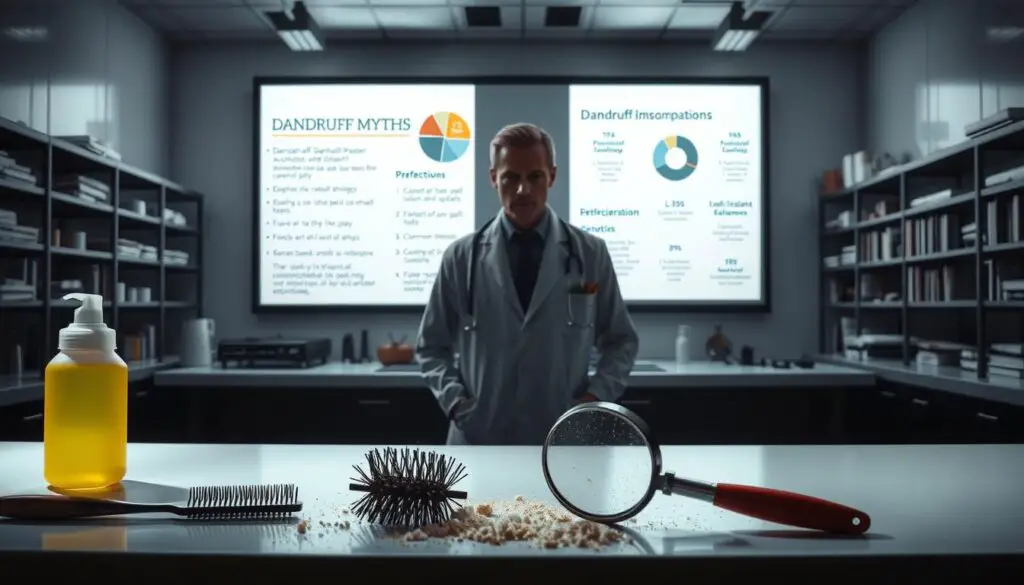
Separating Fact from Fiction
Many people believe wrong things about dandruff, which stops them from getting the right treatment. Let’s look at some common myths:
- Myth: Dandruff is caused by poor hygiene
Reality: Dandruff is mainly due to too much Malassezia fungus, not dirt. About 50% of adults get dandruff, no matter how clean they are.
- Myth: Only people with dry scalp get dandruff
Reality: Dandruff can happen on both dry and oily scalps. It’s more about fungus than dry skin.
- Myth: Dandruff leads to hair loss
Reality: While scalp problems can harm hair, dandruff itself doesn’t cause hair loss. Good scalp care can control symptoms.
Understanding the Realities of Dandruff
“Most cases of dandruff are manageable with the right approach to scalp care and treatment.” – Dermatology Research Institute
The American Academy of Dermatology says dandruff is often caused by fungus or product allergies. Using anti-dandruff shampoos with zinc pyrithione or ketoconazole can help a lot.
Good dandruff treatment means knowing your scalp and using the right methods. Don’t let myths stop you from caring for your scalp.
Long-Term Management of Dandruff
Managing dandruff is more than just quick fixes. Your scalp care routine is key to controlling flaking and keeping hair healthy. Learning the right techniques can change how you manage dandruff.
- Select the best dandruff shampoo with targeted ingredients
- Develop a consistent hair care routine
- Monitor scalp health regularly
- Adjust treatment based on seasonal changes
Establishing a Comprehensive Scalp Care Routine
Your scalp care routine should be tailored to you. Different scalps need different care. For oily scalps, zinc pyrithione is good. Dry scalps need gentler products.
| Scalp Type | Recommended Ingredients | Frequency of Use |
|---|---|---|
| Oily Scalp | Ketoconazole, Piroctone Olamine | 2-3 times per week |
| Dry Scalp | Salicylic Acid, Coconut Oil | 1-2 times per week |
| Sensitive Scalp | Tea Tree Oil, Mild Antifungal Agents | Once per week |
Monitoring Your Progress
Keeping track of your scalp health is important. Use a scalp health journal to note changes. Shampoos like Selsun Blue or Sebamed can help in weeks.
“Consistency is key in managing dandruff. Your scalp’s health reflects your overall care routine.” – Dermatology Experts
Managing dandruff for the long term is a journey. Be patient and consistent. If problems persist, see a professional.
Natural Remedies and Their Effectiveness
Discovering natural dandruff treatments can change your hair care routine. Many look for ways to manage scalp health without commercial products. Natural remedies are gentle yet powerful in controlling dandruff and keeping the scalp healthy.
Herbal and essential oil treatments can offer great relief for dandruff. Studies show many natural ingredients are effective in managing scalp conditions.
Herbal Remedies for Scalp Health
- Neem: Powerful antifungal properties
- Aloe vera: Soothes and moisturizes scalp
- Fenugreek seeds: Reduces inflammation
- Garlic: Targets harmful microbes
Essential Oils for Dandruff Management
Essential oils are popular in hair care for their strong therapeutic effects. Tea tree oil is especially effective, reducing dandruff by about 60% in fungal infections.
| Natural Remedy | Effectiveness | Application Frequency |
|---|---|---|
| Coconut Oil | Moisturizes Scalp | 2x per week |
| Tea Tree Oil | Antifungal Treatment | 1-2x per week |
| Aloe Vera | Reduces Inflammation | 2-3x per week |
“Nature provides some of the most powerful solutions for scalp health.” – Dermatology Research Institute
Consistency is key when using natural dandruff treatments. Start with small amounts and test on a small area first. While these remedies work well, severe cases might need a doctor’s help.
Tips for Using Natural Remedies
- Always dilute essential oils before application
- Use high-quality, pure ingredients
- Monitor your scalp’s response
- Combine with proper scalp hygiene
Remember, results can vary. What works for one might not work for another. Be patient and try different natural remedies to find what works best for your scalp.
How Weather Affects Dandruff
Weather is key in scalp care and affects dandruff battles. Knowing how seasons change your hair care can help fight white flakes better.
Your scalp’s health ties closely to the environment. Winter and dry seasons are tough for dandruff sufferers.
Seasonal Variations and Their Impact
Different seasons pose unique hair care and scalp health challenges:
- Winter’s low humidity dries out the scalp
- Indoor heaters lower moisture even more
- Cold weather messes with natural oil production
- Hats can trap moisture and lead to fungus
Humidity and Dryness Factors
Dry air can cause dandruff by:
- Speeding up skin cell turnover
- Causing scalp irritation
- Lowering natural oil levels
“Keeping your scalp hydrated is crucial for fighting dandruff in tough weather.”
To fight weather-related dandruff, try these hair care tips:
- Wash your hair 2-3 times a week
- Use a humidifier to add moisture
- Choose hydrating hair care products
- Apply natural oils like coconut or tea tree oil
Proactive scalp care keeps your hair healthy through all seasons.
The Connection Between Dandruff and Hair Loss
Dandruff is more than just a scalp issue. It doesn’t directly cause permanent hair loss. But, it can affect your hair care and scalp health a lot. Knowing how dandruff and hair loss are connected is key for good hair care.
Chronic dandruff can harm your hair health. The inflammation and irritation can weaken hair follicles. This might lead to temporary hair shedding. Studies say about 50% of people have dandruff, and it gets less common with age.
Understanding the Scalp Dynamics
Dandruff affects hair health in several ways:
- Increased scalp inflammation
- Weakening of hair follicle anchoring
- Potential disruption of hair growth cycles
- Potential scalp damage from persistent scratching
Addressing Hair Loss Concerns
Good dandruff treatment can lower hair loss risks. Dermatologists say treating the cause of dandruff is key to protecting your hair.
| Dandruff Type | Hair Loss Potential | Recommended Action |
|---|---|---|
| Dry Skin Dandruff | Low | Moisturizing treatments |
| Oily Scalp Dandruff | Moderate | Anti-fungal shampoos |
| Seborrheic Dermatitis | High | Medical consultation |
“Scalp health is directly linked to hair growth and retention” – Dermatology Research Institute
For the best hair care, see a professional if dandruff or hair thinning persists. Using the right dandruff treatment can keep your scalp healthy and reduce hair loss risks.
Frequently Asked Questions About Dandruff
Dandruff can be frustrating and leaves many searching for answers. Knowing the most common questions about dandruff helps you find the right treatment and care for your scalp.
Top Dandruff Questions Answered
Many people have questions about managing dandruff. We’ve gathered the most asked questions to give you clear, expert advice.
- Is dandruff contagious? No, dandruff is not contagious. It comes from skin sensitivity, oil, and fungus.
- How often should I use the best dandruff shampoo? Use anti-dandruff shampoo 1-3 times a week, based on your scalp.
- Can diet impact dandruff? Yes, your diet affects scalp health. Some foods can make dandruff worse.
Expert Treatment Insights
Dermatologists suggest a focused approach to treating dandruff. They recommend using shampoos with Zinc Pyrithione or Ketoconazole.
“Effective dandruff management requires understanding your unique scalp needs and using the right treatment consistently.” – Scalp Care Specialist
Choosing the Right Treatment
When picking a dandruff treatment, consider these important points:
- Know your scalp type
- Choose products with proven ingredients
- See a professional for ongoing issues
Almost all anti-dandruff products offer money-back guarantees. With an average rating of 4.4 out of 5 stars, finding a good solution is easier than ever.
Conclusion: Taking Control of Dandruff
Managing dandruff is a journey many people worldwide understand. Up to 50% of adults deal with dandruff at some point. Finding the right treatment is key, and it starts with knowing your scalp’s needs.
Creating a consistent scalp care routine is crucial. It should work for you and your unique needs.
A Summary of Key Points
The best way to manage dandruff is to use a combination of strategies. Choose a dandruff shampoo with ingredients like Zinc Pyrithione or Ketoconazole. These can help a lot.
Natural solutions like tea tree oil can also help. It can reduce scalp irritation by up to 80%. Taking care of your diet, stress, and hair care can also improve your scalp health a lot.
Encouragement for Your Journey
Remember, 70% of people who manage stress see better dandruff symptoms. You can have a healthier scalp. Stay consistent with your treatment and be patient.
If symptoms don’t get better, talk to a dermatologist. Your dedication to scalp care can change your hair and boost your confidence.
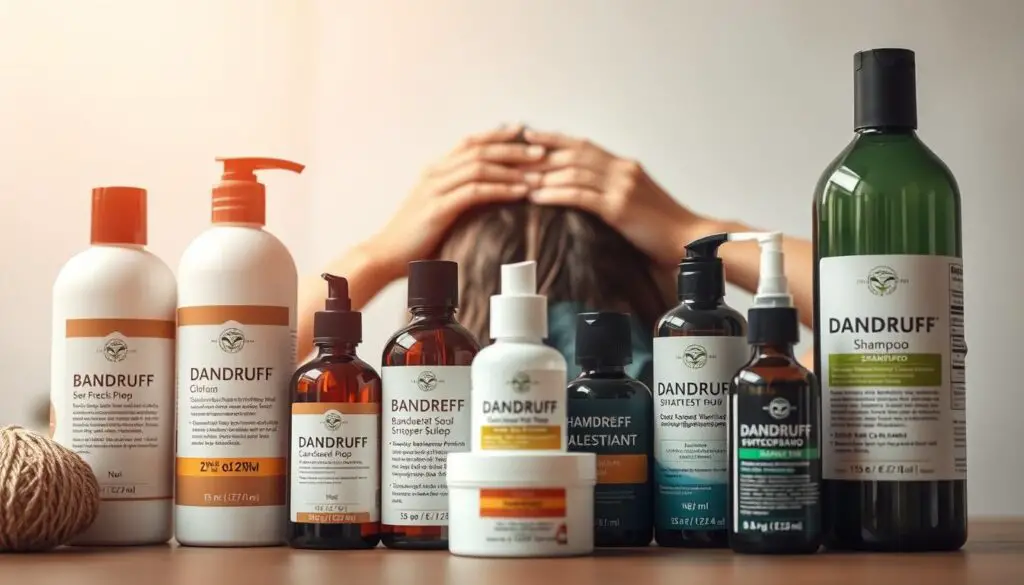
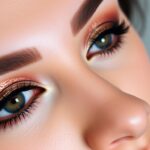
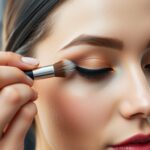
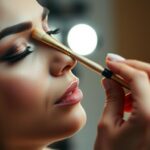



4 thoughts on “BEST DANDRUFF SHAMPOO FOR QUICK RELIEF”